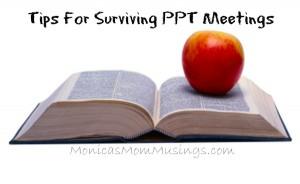If you're new here, you may want to subscribe to my RSS feed. Thanks for visiting!

Image courtesy of Supertrooper / FreeDigitalPhotos.net
Tis the season for PPT’s (Planning and Placement Team) and creating student’s IEP’s (Individual Education Plans) for next year. I currently have 3 children with IEP’s. And while I am far from an expert on the entire process and each of my children’s IEP’s are for minor reasons and mostly one area of struggling where they need extra support in, I do know the whole PPT meeting can be very stressful. Especially when school and parents don’t see eye to eye on what’s best for the child.
I just went to my middle daughter’s PPT meeting. All went well, they did make some changes, but they were ones I did agree would be helpful in her making steps towards growing. It hasn’t always been this simple with our meetings for her though.
Over the years I have learned some things that make things go more smoothly. Mostly it’s going to come down to a parent’s attitude. If you walk into those meetings ready to fight, then it’s not going to go so well. Now, you shouldn’t be a push over. If there’s anything you disagree with you have every right to simply say I need some time to think about this and discuss it with other people. You don’t have to sign something just because they tell you this is what’s best. The operative word in PPT is the T for team. You are a very important part of the team, but you are not the only part. You have to take into consideration the recommendations of some of the experts around you, but you also need to make yourself heard as a team member, but you can’t do that if you have proven to be unreasonable. So here are some tips to help win over the team of educators and to help you feel less like it’s them against you.
How To Have A Successful PPT
- Bring treats. Bake up some muffins or cookies or bring some fresh fruit to share with the team. They have likely been sitting in a conference room for meeting after meeting and would likely welcome a sweet treat.
- Don’t go alone. If you feel that your emotions might get the better of you (completely understandable), then have an advocate with you. There are specific advocates who are well versed in the laws, but it doesn’t have to be a professional. It could be your spouse or a friend who has been through it before, but if you are concerned about rights violations, then it might behoove you to seek out a professional advocate.
- Get on the same page with whoever you bring with you. If you think you might lose your cool in the meeting, then make sure your partner is ready to step in because the last thing you want to do is make anyone think you are not listening.
- Avoid publicly speaking about any gripes you have with the school. Facebook, twitter, your blog, you don’t want to put something out there that the school can find and bring into the meeting to say you’re adversarial and are not interested in what’s best for your child. And you’re just interested in attacking the school. As stressful as things might be and as much as you feel you have to gripe or you need to get this out to help others going through the same thing in the long run it’s just not going to be helpful for your child. If you need to gripe do it in private with your spouse or a trusted friend. Trust me on this, it’s really hard to come back from something like that.
- Don’t make threats. Again, you are a team, supposed to be working together for your child. Making threats towards the other members of the team is counterproductive. If laws are being violated consult a lawyer, but don’t threaten the team with lawsuits unless you know you are prepared to follow through with one. At that point communication would be coming from your attorney anyway.
You need to do everything you possibly can to not be adversarial in these meetings. You need to be a strong advocate for your child, but part of advocacy is listening. So be a good advocate for your child and keep your feelings in check when discussing your wants and needs for your child. Once those communication barriers have been broken it’s really hard to build them back up.
How do you make it through PPT’s?
